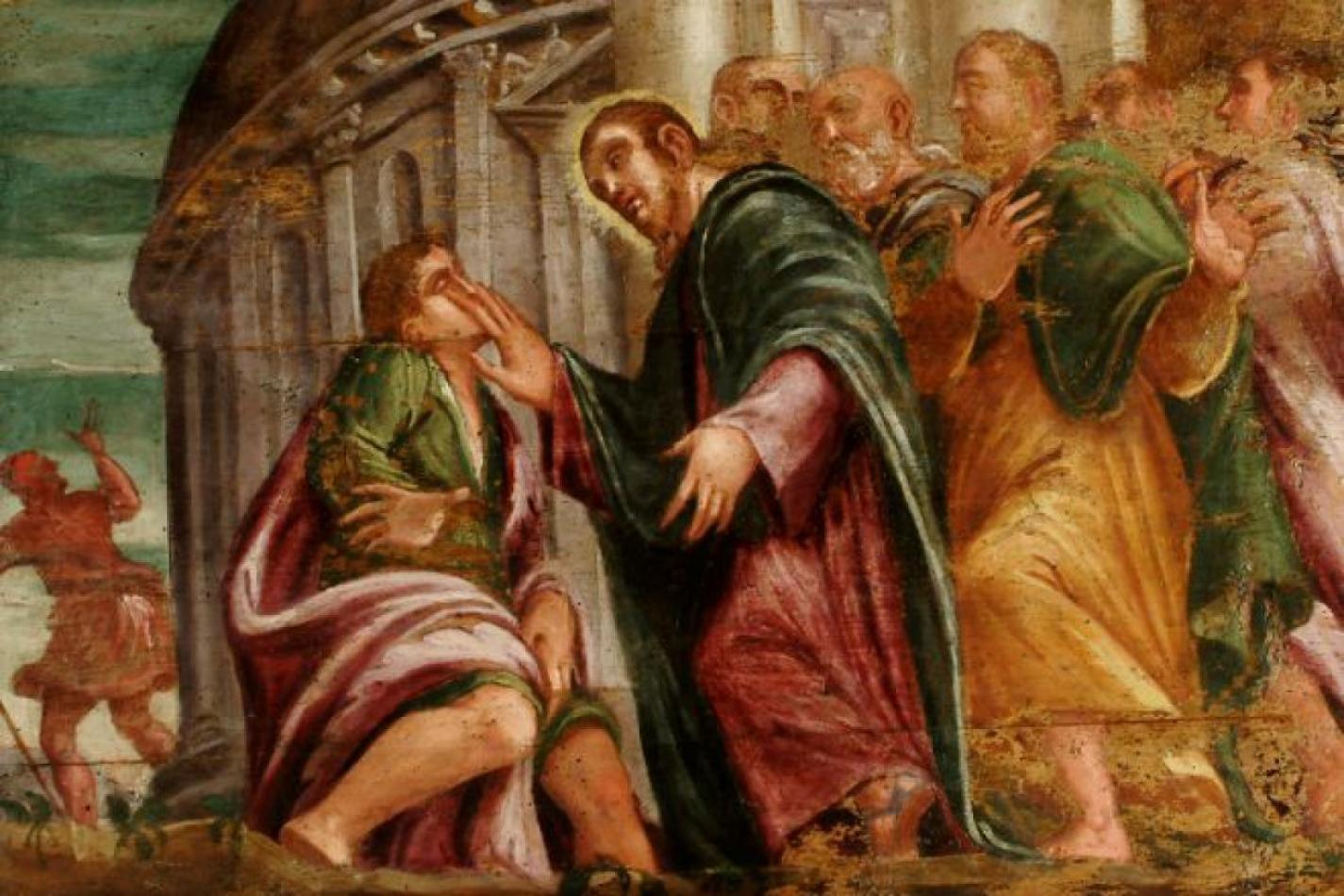Daniel Comboni
Comboni Missionaries
Institutional area
Other links
Newsletter
Mark, in today’s reading, portrays Jesus in “pagan” country, where people were not following Jew religion. But, beyond the religious differences between those people and the people of Nazareth or Jerusalem, there it was a concrete, real man with a concrete, human problem, that is the same for believers and unbelievers, rich and poor, educated and illiterates. That man was deaf and could not speak properly, something that affected his human condition at a very fundamental level. (...)
Free to listen and to speak
A commentary on Mk 7, 31-37
Mark, in today’s reading, portrays Jesus in “pagan” country, where people were not following Jew religion. But, beyond the religious differences between those people and the people of Nazareth or Jerusalem, there it was a concrete, real man with a concrete, human problem, that is the same for believers and unbelievers, rich and poor, educated and illiterates. That man was deaf and could not speak properly, something that affected his human condition at a very fundamental level.
Moreover, it seems clear that what Mark intends with the narration of this experience is to explain to us what the real mission of Jesus is:
Jesus’ mission consists in using the power-love of God (symbolized by the continuous touching with fingers and hands) to liberate humanity, not so much from our physical deafness, but, more important, from our deep inability to understand God and our neighbors, closed up in our own sterile pride. From that deafness comes up also our inability to say meaningful words to others.
When I was a young priest, I have known a ten years old boy, whom everybody thought he was both deaf and mute, till young nun started to give attention to him, accompanying him with a great, continuous and constant love. After some time, she discovered that the child had a physical problem with his ear and took him to the doctors. Solved that problem, the child began to hear the words spoken to him and to repeat them, learning how to listen and how to speak. I was then very much impressed by the power of love, able to start off processes of liberation and healing.
Certainly, not always happens that way, rather in most cases deaf people have to learn how to do without spoken words. But, again, as in the Gospel, the reference is not so much the physical deafness, but that close heart that leads us to close the channels of communication and loving relationship with the members of our family or our community, with people of other cultures, political ideas or religious practices…
Quite often we become “deaf” and “mute” in the deepest side of our personality: we refuse to listen to what other people have to tell us… and for that same reason we are not able to say any “relevant” word to them or to others: we do not have a sincere, meaningful, liberating word to say, because we do not listen.
We remember the story of Emmaus: Jesus approaches the disciples, walks with them and listen to them. Afterwards he would say clarifying and meaningful words.
Sometimes, it seems that our Christian communities have become deaf and mute: They do not listen to the cries of our humanity (Migrants, refugees, young people, women…, nor to the prophets or our time, those people who can help us to understand God’s ways for today. And because of this deafness they become also “mute”, unable to announce any meaningful message to today’s humanity.
A missionary Church is a church that listens, free from the deafness of his pride and arrogance. Only after that liberation, can it become truly missionary, messenger of the good news of God’s love for people.
In the Eucharistic celebration, Jesus “touches” our body. Let us pray that He heals our deafness and liberates our tongues so that we can become true missionaries, healed and instruments of healing, while we continue walking in life towards a fuller communion with God and our fellow men and women.
Fr. Antonio Villarino
Bogotá
Ephphatha! Be opened!
Mark 7: 31-37
by Fr. Raniero Cantalamessa
The passage of the Gospel refers us to a beautiful healing wrought by Jesus. “And people brought to him a deaf man who had a speech impediment and begged him to lay his hand on him. He took him off by himself away from the crowd. He put his finger into the man’s ears and, spitting, touched his tongue; then he looked up to heaven and groaned, and said to him, “Ephphatha!” (that is, “Be opened!”), and (immediately) the man’s ears were opened, his speech impediment was removed, and he spoke plainly” (Mark 7:32-35).
Jesus did not perform miracles as someone waving a magic wand or clicking his fingers. That sigh that escaped from him at the moment of touching the ears of the deaf man tells us that he identified with the people’s sufferings; he participated intensely in their misfortune, made it his burden. On one occasion, after Jesus had cured many sick people, the evangelist comments: “He took our infirmities and bore our diseases” (Matthew 8:17).
Christ’s miracles were never an end in themselves; they were signs. What Jesus once did for a person on the physical plane indicates what he wants to do every day for every person on the spiritual plane. The man cured by Jesus was deaf and dumb; he could not communicate with others, hear his voice and express his feelings and needs. If deafness and dumbness consist in the inability to communicate plainly with one’s neighbor, to have good and beautiful relationships, then we must acknowledge immediately that we are all more or less deaf and dumb, and this is why Jesus addressed to all that cry of his: Ephphatha, Be opened!
The difference is that physical deafness does not depend on the individual and he is altogether blameless, whereas moral deafness is blameworthy. Today the term “deaf” is avoided and we prefer to speak of “auditive disability,” precisely to distinguish the simple fact of not hearing about moral deafness. We are deaf, to give an example, when we do not hear the cry for help raised to us and we prefer to put between ourselves and our neighbor the “double glaze” of indifference. Parents are deaf when they do not understand that certain strange and disordered attitudes of their children hide a cry for attention and love.
A husband is deaf when he cannot see in his wife’s nervousness the sign of exhaustion or the need for a clarification. And the same applies to the wife. We are deaf when we shut ourselves in, out of pride, in an aloof and resentful silence, while perhaps with just one word of excuse or forgiveness we could return peace and serenity to the home. We men and women religious have times of silence in the day, and we sometimes accuse ourselves in confession, saying: “I have broken the silence.” I think that at times we should accuse ourselves of the opposite and say: “I have not broken the silence.”
What decides the quality of communication, however, is not simply to speak or not to speak, but to do so or not to do so out of love. St. Augustine said to people in an address: It is impossible to know in every circumstance exactly what should be done: to speak or to be silent, to correct or to let things go. Here is a rule that is valid for all cases: “Love and do what you will.” Be concerned to have love in your heart then, if you speak, it will be out of love, if you are silent it will be out of love, and everything will be alright because only good comes from love.
The Bible helps us to understand where the rupture of communication begins, where our difficulty originates to relate in a healthy and beautiful way to one another. While Adam and Eve were in good relations with God, their mutual relationship was also beautiful and ecstatic: “This is flesh of my flesh.” As soon as their relationship with God was interrupted, through disobedience, the mutual accusations began: “It was he, it was she …”
It is from there that one must begin again. Jesus came to “reconcile us with God” and thus to reconcile us with one another. He does so above all through the sacraments. The Church has always seen in the seemingly strange gestures that Jesus did with the deaf-mute (he put his fingers into his ears and touched his tongue) a symbol of the sacraments thanks to which he continues “touching” us physically to heal us spiritually.
That is why in baptism the minister carries out gestures on the one being baptized as Jesus did on the deaf-mute: He puts his fingers into his ears and touches the tip of his tongue, repeating Jesus’ word: “Ephphatha, Be opened!”
The sacrament of the Eucharist in particular helps us to overcome the inability to communicate with our neighbor, making us experience the most wonderful communion with God.
[Translation by ZENIT]
http://www.piercedhearts.org





